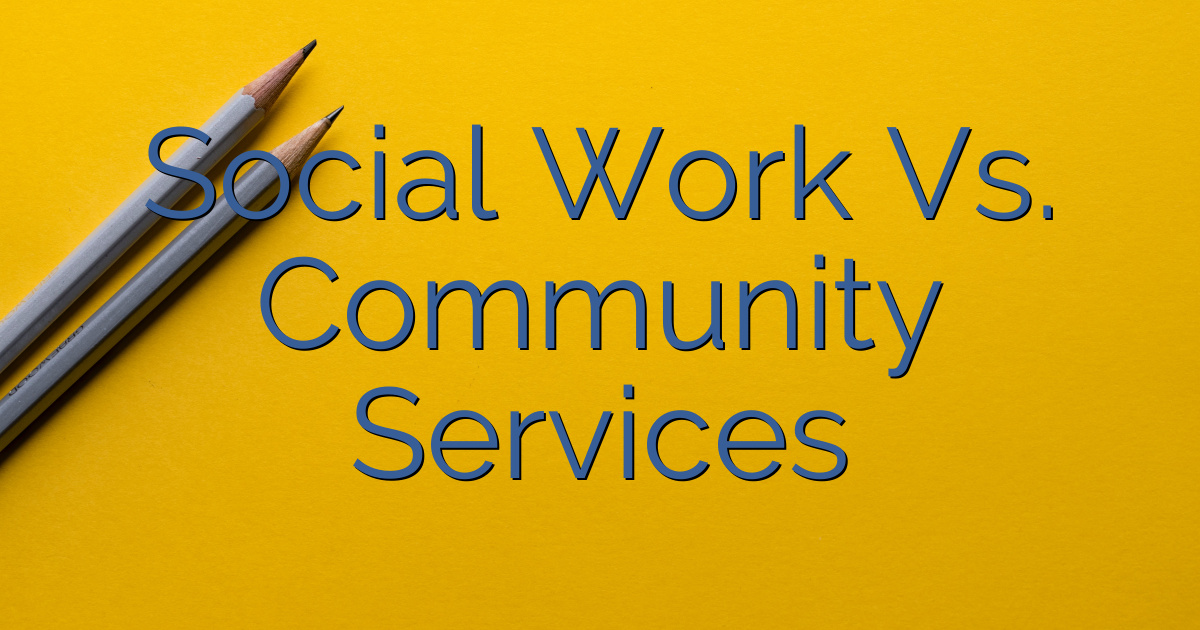 Are you torn between pursuing a degree in social work or community services? Well, look no further! In this article, we will provide you with a comprehensive comparison of these two majors, helping you make an informed decision.
With an overview of the curriculum, skills developed, career opportunities, and salary potential, we aim to equip you with the necessary knowledge to choose the path that aligns with your passion and future goals.
So, let’s dive in and explore the exciting world of social work and community services!
Are you torn between pursuing a degree in social work or community services? Well, look no further! In this article, we will provide you with a comprehensive comparison of these two majors, helping you make an informed decision.
With an overview of the curriculum, skills developed, career opportunities, and salary potential, we aim to equip you with the necessary knowledge to choose the path that aligns with your passion and future goals.
So, let’s dive in and explore the exciting world of social work and community services!
Table of Contents
Key Takeaways – Social Work Vs. Community Services
- Social work and community services both aim to help individuals and communities.
- Both majors involve collaborating with community organizations and are grounded in the principles of social justice.
- Field experience is crucial in both social work and community services, allowing students to apply theoretical knowledge in real-world situations and develop important skills.
- Social work offers various career paths such as child welfare and mental health, while community services offer roles in nonprofit organizations, government agencies, and community centers.
Overview of the two majors: Social Work and Community Services
Social work and community services are two majors that focus on helping individuals and communities. While they share a common goal, there are key differences between social work and community services. Social work is a profession that is grounded in social justice and aims to empower individuals, families, and communities to overcome challenges and improve their well-being. On the other hand, community services is a broader field that encompasses various roles and settings, such as nonprofit organizations and government agencies, to address community needs. Field experience plays a crucial role in both social work and community services programs. It provides students with hands-on opportunities to apply theoretical knowledge in real-world situations. This practical experience allows students to develop essential skills, such as communication, problem-solving, and advocacy, which are vital in assisting individuals and communities effectively. Field experience also helps students understand the challenges and complexities of working in diverse communities, fostering cultural competence and empathy. Overall, field experience enhances the learning experience and prepares students for the demands of professional practice in social work and community services.Overview of the curriculum and requirements of the two majors
The curriculum and requirements for the two majors differ significantly. In social work, the coursework focuses on theories, research methods, and interventions that enhance individuals’ well-being. You will delve into subjects like human behavior, social justice, and policy analysis. Additionally, field placements provide hands-on experience, allowing you to apply classroom knowledge in real-world settings. These placements may include working with diverse populations, such as children, the elderly, or individuals with mental health challenges. On the other hand, community services majors emphasize community development, advocacy, and program management. Your coursework will involve studying community dynamics, grant writing, and nonprofit leadership. Field placements in this major often involve collaborating with community organizations to address social issues and develop resources. Overall, both majors equip you with the skills and knowledge needed to make a positive impact in society, albeit through different approaches.Overview of coursework, assessments, and field placements
In both majors, you will complete coursework, assessments, and field placements to gain practical experience and apply classroom knowledge in real-world settings. The coursework will cover a wide range of topics, including social work theory, human behavior, policy analysis, and community development. Assessments may include exams, essays, and presentations to evaluate your understanding of the material. Field placements are an essential component of both majors, allowing you to work directly with individuals, families, and communities. These placements provide valuable hands-on experience and the opportunity to apply the skills and knowledge learned in the classroom. They may involve working in social service agencies, community centers, hospitals, or schools. The following table provides an overview of the coursework and field placement requirements for both majors:| Major | Coursework | Field Placements |
|---|---|---|
| Social Work | Social Work Practice, Social Welfare Policy, Human Behavior | Social service agencies, hospitals, schools |
| Community Services | Community Development, Program Evaluation, Policy Analysis | Community centers, non-profit organizations |
Comparison of Skills Developed: Communication and Advocacy
Communication and advocacy skills are essential components of both majors, allowing you to effectively convey information and advocate for individuals and communities. In social work, communication skills are crucial for establishing rapport with clients, actively listening to their needs, and effectively conveying information about available resources. Advocacy skills are developed to empower and support vulnerable populations, advocating for their rights and access to necessary services. Similarly, in community services, communication skills play a vital role in engaging with community members, understanding their needs, and effectively disseminating information about available programs and resources. Advocacy skills are honed to identify systemic issues and work towards social change, advocating for policies and programs that benefit the community as a whole. Both majors emphasize the importance of effective communication and advocacy in creating positive change and promoting social justice.Comparison of Career Opportunities and Job Roles in Social Work Vs. Community Services Fields
When considering career opportunities and job roles, you’ll find that both majors offer a wide range of options for making a difference in people’s lives. Whether you choose social work or community services, both fields provide avenues for career advancement and job satisfaction. Here are three key points to consider:- Social work offers various career paths such as child welfare, mental health, and healthcare. With a Master’s degree, you can become a licensed clinical social worker and have the opportunity to open your own private practice or work in specialized settings.
- In community services, you can work in nonprofit organizations, government agencies, or community centers. Roles include community outreach, program coordination, and advocacy. You can also advance into leadership positions, such as program director or executive director.
- Both fields provide opportunities to positively impact individuals, families, and communities. The satisfaction of helping others and seeing the positive changes in their lives is a common thread in both social work and community services.
Comparison of Salary Potential: Job Market Trends
Now that you have a clear understanding of the career opportunities and job roles in social work vs. community services, let’s dive into another important aspect of these fields: salary potential and job market trends. It’s essential to consider these factors when making career decisions, as they can greatly impact your job satisfaction and job stability. To give you a better idea, let’s compare the average salaries in both fields:| Job Title | Social Work | Community Services |
|---|---|---|
| Social Worker | $50,470 | $44,380 |
| Case Manager | $40,080 | $38,060 |
| Program Coordinator | $48,220 | $42,480 |
| Outreach Worker | $38,740 | $35,830 |
Similarities in curriculum between social work and community services
If you’re considering a career in either field, you’ll find that the curriculum for social work and community services share many similarities. Both fields focus on providing support and assistance to individuals and communities in need. Here are some key similarities you can expect to encounter:- Core coursework: In both social work and community services, you’ll study topics such as human behavior, social welfare policies, and ethics. This foundational knowledge is essential for understanding the complexities of working with diverse populations.
- Practical experience: Both fields emphasize the importance of gaining hands-on experience through internships and field placements. These opportunities allow you to apply theoretical knowledge in real-world settings, developing your skills and building a strong foundation for your future career.
- Self-care: Recognizing the emotional toll of working in these fields, both social work and community services emphasize the importance of self-care. You’ll learn strategies to maintain your own well-being, ensuring that you can effectively support others without burning out.
Difference in job prospects between social work and community services
Although there are similarities in curriculum, the job prospects differ between the fields of social work and community services. When considering a career in social work, you can expect a wide range of job opportunities. Social workers are in high demand, especially in areas such as child welfare, mental health, and healthcare settings. With a degree in social work, you can pursue various roles, including case manager, therapist, or advocate. On the other hand, community services provide a different set of career opportunities. While social work focuses on individual and group well-being, community services aim to enhance the overall community’s quality of life. This can involve working in nonprofit organizations, government agencies, or community development projects. Job prospects in community services may include positions such as community outreach coordinator, program manager, or community organizer. Ultimately, both fields offer rewarding career paths, but it’s essential to consider your interests and goals when deciding which path to pursue.Factors to consider when choosing between social work and community services majors: passion
When deciding between social work and community services, it’s important to consider your passion for making a difference in individual lives versus improving communities as a whole. Both fields offer unique opportunities to create positive change, but the focus and approach differ. If you are driven by a deep empathy for individuals and a desire to support them on a personal level, social work may be the right path for you. Social work majors often work one-on-one with clients, providing counseling, advocacy, and support. On the other hand, if your passion lies in implementing broader initiatives and creating systemic change, community services may be a better fit. Community services majors focus on developing and managing programs that address the needs of communities. Consider your personal values and career goals when making this important decision, as it will ultimately shape the impact you can have on the world.What is the difference between social work and community services in the context of social work vs. community development?
Social work and community development both aim to address social issues, but they have distinct focuses. Social work involves direct support and intervention for individuals and families, while community development focuses on empowering entire communities to create sustainable positive change. Both fields play crucial roles in promoting social well-being.

